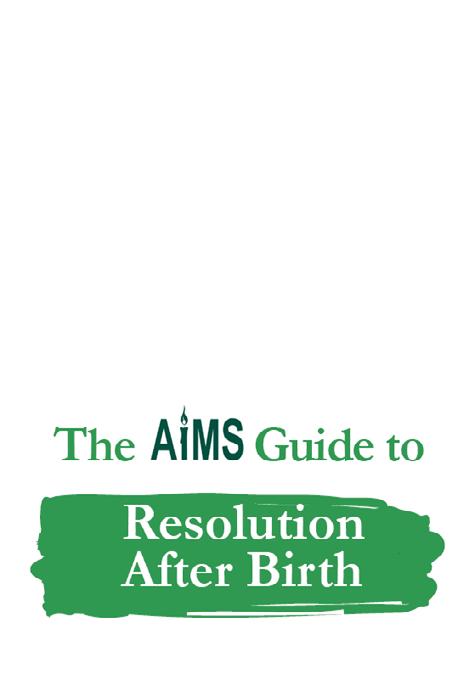
4 minute read
AIMS Commentary on the Ockenden Interim Report (10 December 2020
from AIMS Journal Vol 33 No 1 Salutogenesis
by AIMS (Association for Improvements in the Maternity Services)
By Anna Madeley
AIMS welcomes the publication of the interim Ockenden Report12 relating to 250 cases involving the care of mothers and their babies that have so far been assessed by the ongoing independent investigation of maternity services at the Shrewsbury and Telford Hospital NHS Trust (SaTH). Like the review team, AIMS is concerned that many of the issues raised are reflective of previous reports on poor maternity care in NHS trusts across the UK.
Advertisement
The review, which was set up at the request of Jeremy Hunt, then Secretary of State for Health and Social Care, is being conducted by a multidisciplinary clinical team of independent external reviewers, chaired by Donna Ockenden.
It is anticipated the final report will be published in the second quarter of 2021. However, as more families have contacted the authors (1,862 cases are in review in total), an interim report has been necessary to share the ‘immediate and essential actions’ for urgent implementation at the Trust and for reflection and, as the authors emphasise, for consideration across all NHS trusts in the UK. AIMS welcomes the decision to present these interim findings and recommendations.
The report is a sobering read, detailing – alongside recurrent themes – vignettes illustrating the organisational and systematic failures that have occurred. Good leadership and multidisciplinary team working across midwives,
12 ‘Ockenden Report: Emerging Findings and Recommendations from the Independent Review of Maternity Services at the Shrewsbury and Telford Hospital NHS Trust’, December 2020, www.ockendenmaternityreview.org. uk/wp-content/uploads/2020/12/ockenden-report.pdf obstetricians, anaesthetists and neonatologists is a fundamental tenet of quality maternity care. Sadly, many of the vignettes and recommendations underline a failure to bring these disciplines together cohesively, particularly in relation to the escalation of concerns and the provision of compassionate care.
The report addresses the extent of Care Quality Commission (CQC) and local Clinical Commissioning Group (CCG) oversight of the Trust, where concerns have previously been raised; the review team is continuing to scrutinise these results and will present its findings in the final report. Additionally, the problems surrounding senior Trust leadership instability over the preceding 20 years, and the resultant view of many historical problems as ‘legacy’ issues, highlight the fundamental necessity to address safe and effective service provision, whilst learning from incidents through robust and thorough investigations. Sadly, the report highlights how the lack of such processes may have contributed to the failure to develop continuous service improvement.
Of particular concern to AIMS are those issues which are reflective of previous reports into poor maternity care in NHS trusts across the UK. Themes include a failure to complete initial and ongoing risk assessment of women and their babies, a lack of escalation of concerns by midwives and junior obstetricians where there is a deviation from the normal course of pregnancy, labour and recovery in the early weeks after birth, injudicious use of oxytocin in the management of labour, the drive to reduce caesarean rates at any cost, and inadequate bereavement care. In other words, there were failures in offering ‘too much too soon’ as well as ‘too little too late’.13
13 S. Miller et al., ‘Beyond too little, too late and too much, too soon: a pathway towards evidence-based, respectful maternity care worldwide’, The Lancet, 2016, https://www.thelancet.com/journals/lancet/article/ PIIS0140-6736(16)31472-6/fulltext
The authors present seven Immediate and Essential Actions which they recommend that all maternity services across the UK consider and implement. These are:
Enhancing safety Listening to women and their families Staff training and working together Managing complex pregnancy Risk assessment throughout pregnancy Monitoring fetal wellbeing Informed consent
There is more detail about the recommendations for each of these actions in chapter 5 of the interim report.
AIMS considers it vital that all NHS trusts provide services that are committed to continuous improvement in safety, strong leadership with a workplace culture that challenges poor practice and cultures, and above all ensuring that women and their families are listened to.
Anna is a registered midwife and doctoral researcher in the field of maternity care. Previously Anna has worked as a midwife within three NHS trusts, establishing and leading a homebirth team in her last clinical role, and as a Senior Midwifery Lecturer prior to starting her studies. She continues to work as an Associate Lecturer in Midwifery across two universities alongside her research.
This wonderfully thorough book is worth its weight in gold.
Have you had a distressing experience with the maternity services? Are you concerned that other people could have a similar experience? Do you feel angry about it - or sad - or deeply traumatised?
Do you know what you can do about it?
The AIMS Guide to Resolution is a comprehensive and empathic source of information about who can help, what your options are, how to navigate the formal complaints system and much more... Available in paperback and kindle fomats www.aims.org.uk/shop
www.aims.org.uk/shop









